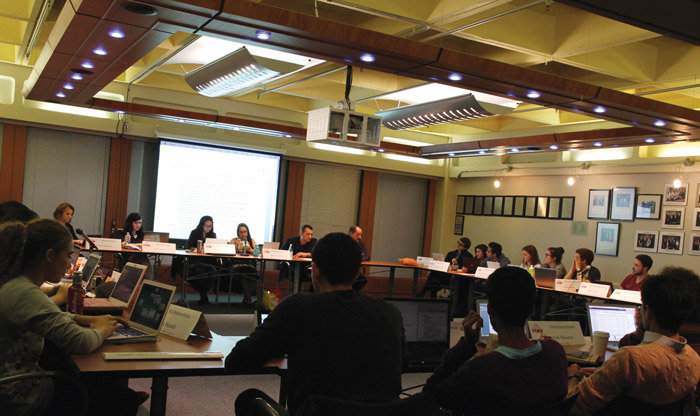Motion on restricting discretionary funding
The Students’ Society of McGill University (SSMU) Legislative Council tabled and discussed a motion titled Amendment of the Clubs and Services Portfolio By-Law Book at its meeting last Thursday.
Originally moved by VP Finance and Operations Kathleen Bradley and VP Clubs and Services Stefan Fong, the motion sought to limit discretionary funding for projects and events that were in accordance to the services mandate and directly affected students.
Fong elaborated on the bylaw’s purpose.
“The money that is raised by students [through service fees] should be given back to students through the provision of services,” he said. “If the service would like to donate money toward a project that does not directly benefit students, they are welcome to do the fundraising toward that goal and donate the money that is raised off of their efforts.”
An amendment requiring the VP Finance and VP Clubs and Services to present a report regarding the breakdown of each service’s use of discretionary funding at the end of each semester was also passed and added to the motion.
“I do not see this to be an approval process but merely a way of reporting,” Bradley said in response to concerns over potentially infringing upon the services’ financial autonomy. “It is not a judgment of the Council, but more like a transparency process.”
The motion has been postponed until the next Council meeting for the SSMU services to be consulted regarding the amendment.
Discussion on funding for library extended hours
VP University Affairs Claire Stewart-Kanigan explained that students had helped fund extended library hours during exam season for several years.
“All the hours after midnight that the library is open for has been funded by the SSMU Library Improvement Fund for 10 years now,” Stewart-Kanigan said. “There have been concerns over the lack of consideration of these largely security-based expenses as operational costs that the university should be funding.”
The Library Improvement Fund, to which students and alumni contribute, amounts to $650,000 a year. The fund comprises of contributions of $8.50 per full-time student and $4.25 per part-time student each semester, matched equally by alumni donors. According to Library Improvement Fund Coordinator Erin Sobat, the library’s extended hours cost $250,000 a year.
“Students might not be aware that it’s student money that has been running this,” Stewart-Kanigan said. “The option of using this $250,000 for student projects or specific initiatives to improve the library experience [has been overlooked] because of something the university should be funding.”
There was a general consensus that students must be made aware of SSMU’s funding of the extended hours, and should also be encouraged to explore other initiatives that the Library Improvement Fund could sponsor.
SSMU President Courtney Ayukawa further emphasized the importance of students speaking to the administration about a change for extended hours to be recognized as a part of McGill’s operational budget.
“In my opinion, when students care about something loudly enough, the administration does listen and make changes,” Ayukawa said. “However, I would hate for this demand to be loud enough for the university to care [only] after the 24-hour library access has been lost.”
Informal discussion on last week’s General Assembly
The Council agreed that the GA last Wednesday was a success, despite some logistical and procedural issues.
Physical and Occupational Therapy representative Yasmine Hadifi raised concerns about students’ lack of procedural knowledge regarding Robert’s rules. In response to Hadifi, Engineering representative Anikke Rioux suggested better access to Robert’s Rules for the students.
“Hosting some sort of online tutorials to explain Robert’s rules beforehand would be conducive to a more fluid GA,” Rioux suggested. “Assigning councillors certain duties and having us wear an identifiable colour of t-shirts at the GA to help students with questions would [also] be helpful.”
VP Internal Daniel Chaim argued that students’ interest in the motions affected participation in the GA.
“The real conflict wasn’t about the mandate or the program, but that most people were only concerned with one motion,” Chaim said. “A lot of people were upset, but what the SSMU was mandated to do was to entertain the students’ right to voice their opinions at the GA.”
Arts & Science Senator Chloe Rourke applauded the GA’s turnout.
“Being in a building for 10 hours with nearly 800 people is excessive [and] is not really expected of average students [who] showed their commitment towards student politics,” Rourke said.
Arts representative Alexander Kpeglo-Hennessy also commented on the activeness demonstrated by students at the GA.
“[My] constituents were happy that they went in spite of the result because it was an excellent example of students actively participating in a democracy,” Kpeglo-Hennessy said.
Motion to support the #ConsentMcGill campaign
The Council passed a motion supporting the #ConsentMcGill campaign and taking action against sexual violence. Apart from reaffirming SSMU’s support for the campaign, the motion encouraged SSMU to lobby the McGill administration to institutionalize the position of sexual assault response coordinator and to host consent campaigns, education projects, and initiatives based around action against sexual violence in collaboration with student groups on an annual basis. The motion was passed with unanimous support and Council also agreed to be codified as a policy by the end of the year to ensure that its reach remains wide-ranging and effective in the long run.









